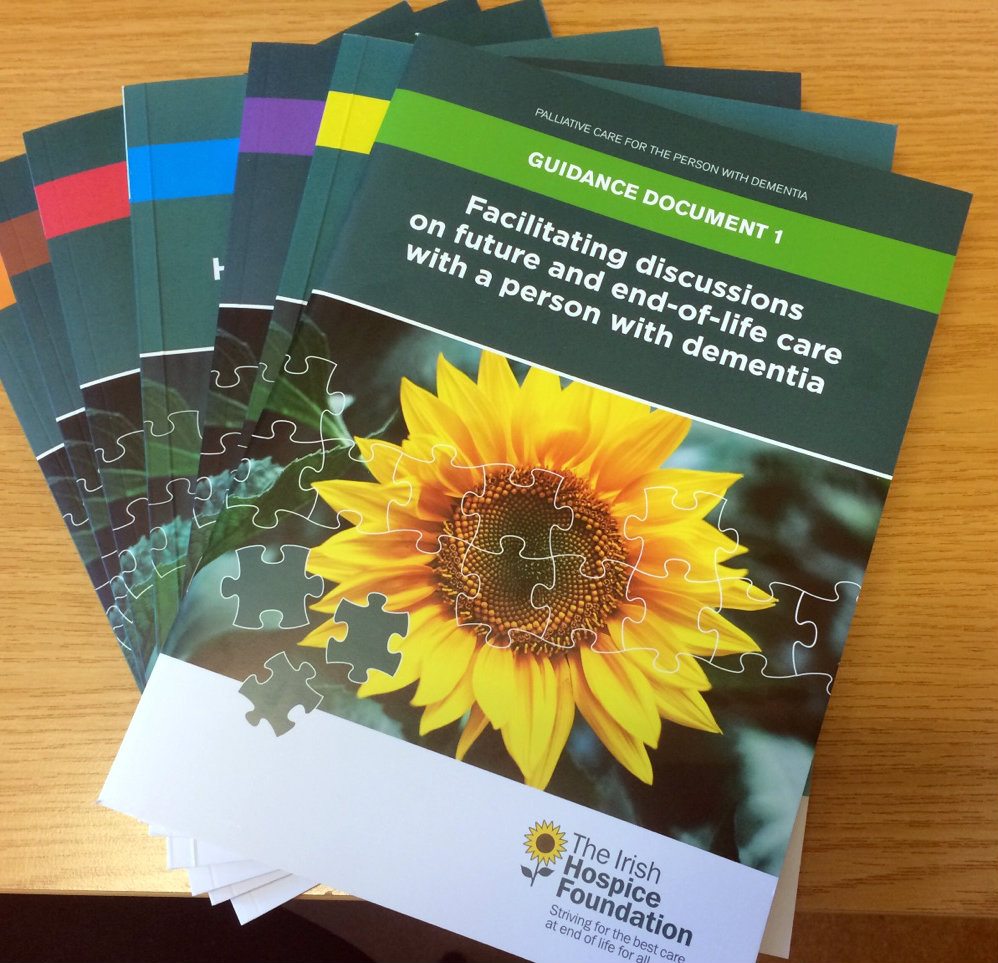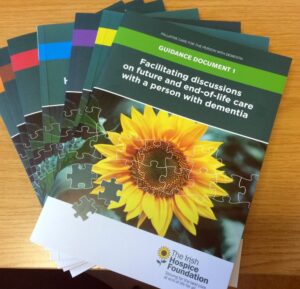A suite of guidance documents for healthcare staff to help improve palliative care for people with dementia has been released.
The seven Irish Hospice Foundation (IHF) guidance documents are designed to support healthcare staff to address specific aspects of dementia palliative care in all care settings.
They were developed by the IHF in collaboration with researchers at University College Cork to fill an identified gap in practice guidelines for people providing palliative dementia care.
Irish Hospice Foundation, Head of Healthcare Programmes Marie Lynch said: “People dying with dementia – that may or may not have co-morbidities – are a particularly vulnerable group. They require staff to have knowledge, skills, competence and confidence in both dementia and palliative care.
“Providing this care and comfort can present services with a significant challenge as each person’s journey through dementia is unique with difficulties in communication, variability in the final phase and lack of awareness about the terminal nature of dementia. While there is growing recognition of the complexities involved in this care there was a notable void in practice guidance for staff.
“These new guidelines will help to fill that void and help fulfil the IHF vision that no one should face death or bereavement without the care and support they need.”
Senior lecturer, Dr Alice Coffey led the team of researchers at the Catherine McAuley School of Nursing and Midwifery at University College Cork to produce four of the seven new guidance documents.
Dr Coffey said: “The purpose of these guidance documents is to support healthcare staff in delivering excellence in end-of-life care for people with dementia. The guidance will also assist all caregivers in understanding the palliative care needs of people with dementia. Ultimately the benefits will be to the person with dementia and to their care and comfort.”
Palliative dementia care involves supporting the person with dementia and their family to address the pain, distress and discomfort associated with advancing dementia and invite them to participate in making decisions about future care needs.
Broadcaster Valerie Cox who spent two years studying for a Master’s Degree in End-of-Life issues in UCC officially launched the documents at University College Cork.
Ms Cox said: “These guidance documents are an excellent resource for professionals in all care settings and for caregivers of persons with dementia. There are fact sheets highlighting key points to guide practice. The guidance provided is up to date and evidence based.”
Key areas were selected as a focus for the guides:
- Facilitating discussion on future end-of-life care with a person with dementia.
- Advance care planning and advance health care directives with a person with dementia.
- Loss and grief in dementia.
- Management of hydration and nutrition.
- Pain assessment and management.
- Ethical decision making in end-of-life care and the person with dementia.
- Medication and dementia: Palliative assessment and management.
The guidance documents consider all stages of dementia and include consideration of all people impacted by dementia including young people with dementia and people with intellectual disabilities.
Case studies have been developed for the guidance documents representing scenarios that occur in clinical practice.
While recognising that each person should be cared for on an individual basis; the case studies act as guidance to healthcare staff on ways to respond in certain situations for example when a person with dementia is experiencing loss and grief.
Some case studies have been developed as a guide to illustrate the advance care planning process and the role of advance healthcare directives in practice.
Dementia is a chronic, degenerative, life-limiting illness that affects mental capacity and communication.
There are about 47,000 people living with dementia in Ireland with the number expected to triple to 132,000 over the next thirty years as the population ages.
Recent research conducted by the IHF shows that 4,200 people with dementia die in Ireland each year. About 2,310 people with dementia die in residential care settings in Ireland every year and a further 1,680 die in acute hospitals. But the national charity estimates that only 210 people with dementia die in their own homes.
A core team of eight researchers from the School of Nursing & Midwifery, Centre for Gerontology and Rehabilitation at UCC and St Luke’s Home Mahon developed the guidance documents in Pain, Hydration & Nutrition, Medication Management and Ethical Decision Making. The IHF developed the remaining three. The documents were developed as part of the Irish Hospice Foundation’s Changing Minds: Promoting Excellence in End-of-Life Care for People with Dementia programme funded by Atlantic Philantrophies. The guidance documents are available on-line to download and can be accessed here:
Hard copies of the fact sheets can be obtained by contacting: [email protected]




